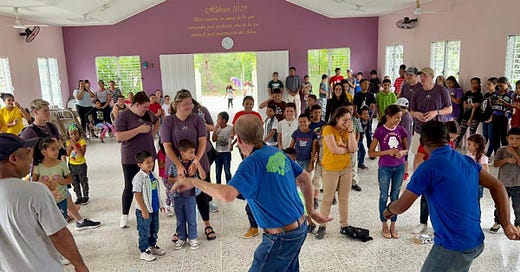Should Associations Sponsor Missions Trips?
A perspective for local denominational organizations/judicatories on how they best empower their churches for missional learning experiences.
Rundown: Articles on Baptist associations are often applicable to the local denominational organizations/judicatories of various denominations. They may be called associations, districts, classis, synods, and by other names. They are typically organisms more than organizations. Relational more than functional. Regional and national expressions of denominations are more organizational and functional.
GBJ Blog Post 101 includes—a Column, personal Reflections from George, and questions for your Reaction.
(This column appears this week in the digital and print edition of The Baptist Paper. Access the column in the digital edition HERE. The Baptist Paper is a publication of TAB Media. Request a free trial HERE. See all TAB Media columns written by George Bullard HERE.)(Subscribe to this Substack Blog using the “Subscribe now” button below.)
Should Associations Sponsor Missions Trips?
Recently an anonymous post on a social media site for associational missions strategists asked participants about sponsoring missions trips. Should these only be done by churches, or should the associational organization also sponsor trips?
Several dozen associational directors responded with various viewpoints and reasons in favor of or opposed to the idea. Some presented third alternatives.
The issue, however, needs additional thinking and insights regarding the best role for associations.
The Best Sponsors are Always Churches
First, because associations in their purest form are churches in association with one another, the best answer is that churches should be the primary sponsors of missions trips. This is always possible but not always a reality.
Second, the associational staff and organization should be catalysts that come alongside churches that take missions trips by providing them with a perspective that makes the trips Great Commission and great commandment learning experiences. This is also always possible but not always a reality.
Third, the missions organizations of the denomination can provide support for the administration and logistics of trips. They can assist with orientation for the missions trip volunteers.
(Continue reading HERE.)
Reflections from George:
As I expected, this column once posted this past Sunday (March 24, 2024) on The Baptist Paper web site, (See it HERE) created some dialogue on social media. I wrote it in response to an anonymous posting on a social media site where people who work for Baptist associations dialogue about various issues. The anonymous post asked if associations should sponsor missions trips and asked for pros and cons on this issue.
Once the anonymous post person read my column, they posted this response: “You did a GREAT job with the article. I was the ‘anonymous poster’ that prompted the discussion referred to in your report. I was gathering info for a ZOOM discussion I then led with AMSs (Bullard comment: he meant directors of Baptist associations) across our state. While our bottom-line matched the conclusions in your article, you did a great job laying it out. Thanks!”
He got the focus and point of the column!
Another association leaders said, “Spot on! The missions trips I’ve been on did great preparation both spiritually and culturally. However, the topic of a debriefing is something we all need. It’s a harvest of ministry that can be missed. Bring home the lessons learned and apply them.”
Two perspectives were raised by others who commented on social media that I would like to address.
First, a couple of associational directors said the association as an organization (which is different from seeing a Baptist association as a family of churches-in-association) sponsors missions trips because of the large number of smaller membership churches with bivocational/covocational pastors in their associations who could not organize a missions trip on their own.
My response is that this is exactly why churches—often a cluster of churches when they are smaller membership churches—ought to sponsor missions trips. I stated—or at least implied—in the column that the associational organization could play a catalytic role in encouraging missions trips. They can match churches who would like to consider a missions trip, and thus build capacity among a cohort of churches to conduct a missions trip. This also empowers the family of churches to be on joint mission.
The associational organization can nudge these churches toward a mission field with racial, ethnic, cultural, or socio-economic groups who might be present in the associational fellowship area and are unreached by the gospel. Thus, their missions trip becomes a learning opportunity for all they might do in missional engagement when they return home.
The associational organization can sponsor the orientation and debriefing to morph the missions trip into a missional learning experience with missions action following the debriefing. (Bullard: A key point in my column.)
Second, another response focused on the associational organization as a missions trip planner in response to regional and national denominational initiatives. This response comes across as programmatic and not strategic. As a response to regional and national denominational initiatives rather than a response to what is most needed next in their associational fellowship area in terms of missional engagement.
Reactions:
You are invited to share some reactions (comments) to this article and my reflections. Here are questions to guide your reaction:
Should associations or other local denominational organizations/judicatories sponsor national and internal missions tripes, or should primarily churches (individually or in a cluster) sponsor them with catalytic support from their denomination?
What do you see as the difference between “missions tourism” and “missional learning experiences” when thinking about missions trips?
Is it more important for associations and other local denominations /judicatories to coordinate all missions trips or to empower churches to branch out in various mission efforts? Why?
What should we hope church groups who go on missions trips do after they return home to engage missionally in their local context?




